|
De komende oorlog tegen Iran - deel 6
Preëmptieve nucleaire aanval, lente 2006?
Door Daan de Wit
Zoals we in de voorgaande vijf delen hebben beschreven, maken de VS, Israël en Engeland zich op voor een aanval op Iran, een preëmptieve nucleaire aanval, als het aan de VS ligt. Premier Sharon van Israël gooit alvast wat olie op het vuur: 'ISRAEL'S armed forces have been ordered by Ariel Sharon, the prime minister, to be ready by the end of March for possible strikes on secret uranium enrichment sites in Iran, military sources have revealed', schrijft The Sunday Times. In dezelfde periode worden de komende midterm-verkiezingen belangrijk in de VS. Een oorlog met Iran zou dan niet slecht uitkomen voor de Republikeinse partij, zo beweren meerdere specialisten in deze DeepJournal. De Sunday Times vervolgt: '[...] Sources inside special forces command confirmed that “G” readiness — the highest stage — for an operation was announced last week'. Israel ontkent de plannen. De Times houdt ook rekening met retoriek in verband met Israëlische verkiezingen: 'The date set for possible Israeli strikes on Iran also coincides with Israel's general election on March 28, prompting speculation that Sharon may be sabre-rattling for votes.' Iran nog ver af van fabriceren nucleair wapen De Washington Post schrijft in september: 'A recent U.S. intelligence estimate [...] judged Iran to be as much as a decade away from being able to manufacture the fissile material necessary for a nuclear explosion. A report issued last week by the International Institute for Security 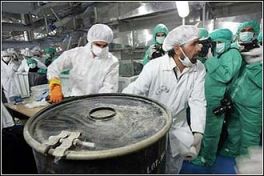 Studies, a London-based research group, found Iran was 10 to 15 years from the technical know-how to build a bomb.' Toch schreeuwen Bush, Sharon en Blair moord en brand. In 2002 schrijft The London Times: '[...] Sharon [...] considers that Iran is a "centre of world terror", and that as soon as an Iraq conflict is concluded, he will push for Iran to be at the top of the "to do" list [...]'. En deze maand nog noteerde Reuters: '"Israel, and not only Israel, cannot accept a situation in which Iran has nuclear weapons," Sharon told reporters. "We are also taking all the necessary preparations to be ready for this kind of situation."' 'Teheran would not be allowed to become a "threat to our world security"', aldus Tony Blair. 'Asked whether Mr Blair was making a veiled threat of military action, a senior government source replied: "The prime minister didn't use the 'M' word - but he is making clear that we have to think about these things very seriously indeed."' Studies, a London-based research group, found Iran was 10 to 15 years from the technical know-how to build a bomb.' Toch schreeuwen Bush, Sharon en Blair moord en brand. In 2002 schrijft The London Times: '[...] Sharon [...] considers that Iran is a "centre of world terror", and that as soon as an Iraq conflict is concluded, he will push for Iran to be at the top of the "to do" list [...]'. En deze maand nog noteerde Reuters: '"Israel, and not only Israel, cannot accept a situation in which Iran has nuclear weapons," Sharon told reporters. "We are also taking all the necessary preparations to be ready for this kind of situation."' 'Teheran would not be allowed to become a "threat to our world security"', aldus Tony Blair. 'Asked whether Mr Blair was making a veiled threat of military action, a senior government source replied: "The prime minister didn't use the 'M' word - but he is making clear that we have to think about these things very seriously indeed."'Geruchten van oorlog tegen Iran in lente 2006 In september schrijft het Indiase The Telegraph: 'Top-ranking Americans have told equally top-ranking Indians in recent weeks that the US has plans to invade Iran before Bush's term ends. In 2002, a year before the US invaded Iraq, high-ranking Americans had similarly shared their definitive vision of a post-Saddam Iraq, making it clear that they would change the regime in Baghdad.' 'In a season of discontent for the White House, Tuesday's election results intensified Republican anxiety that next year's midterm contests could bring 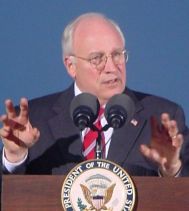 serious losses unless George W. Bush finds a way to turn around his presidency and shore up support among disaffected, moderate swing voters', schrijft The Washington Post bijna twee maanden later. Ook auteur Dan Plesch ziet de aanloop naar de periode van de midterm als een goede mogelijkheid: 'For US domestic political purposes a “crisis” in spring 2006 when the EU and the UN can once more be confronted with their alleged failures, and challenged to support US leadership, would be timely for mid-term elections in which the ultra-conservative coalition will wish to consolidate its gains and eliminate any nascent moderate or realistic Republican candidate in good time for the 2008 presidential election.' 'As for the succession to President Bush, Bob Woodward has named Mr Cheney as a likely candidate, a step that would be easier in a wartime atmosphere', schrijft Plesch in een ander artikel. Dan inmiddels president Cheney kan zich -na Iran- gaan richten op Syrië en Noord-Korea en -volgens Plesch tijdens een debat over een mogelijk op handen zijnde oorlog met Iran, afgelopen zaterdag in de Rode Hoed- op China. Plesch zei (en eerder schreef) tijdens zijn presentatie dat de 'US strategy is to prevent any state being able to deter it as did the USSR'. Dat betekent volgens hem dat nu Iran aan de beurt is en later China. serious losses unless George W. Bush finds a way to turn around his presidency and shore up support among disaffected, moderate swing voters', schrijft The Washington Post bijna twee maanden later. Ook auteur Dan Plesch ziet de aanloop naar de periode van de midterm als een goede mogelijkheid: 'For US domestic political purposes a “crisis” in spring 2006 when the EU and the UN can once more be confronted with their alleged failures, and challenged to support US leadership, would be timely for mid-term elections in which the ultra-conservative coalition will wish to consolidate its gains and eliminate any nascent moderate or realistic Republican candidate in good time for the 2008 presidential election.' 'As for the succession to President Bush, Bob Woodward has named Mr Cheney as a likely candidate, a step that would be easier in a wartime atmosphere', schrijft Plesch in een ander artikel. Dan inmiddels president Cheney kan zich -na Iran- gaan richten op Syrië en Noord-Korea en -volgens Plesch tijdens een debat over een mogelijk op handen zijnde oorlog met Iran, afgelopen zaterdag in de Rode Hoed- op China. Plesch zei (en eerder schreef) tijdens zijn presentatie dat de 'US strategy is to prevent any state being able to deter it as did the USSR'. Dat betekent volgens hem dat nu Iran aan de beurt is en later China.Veiligheidsraad -net als bij Irak- een formaliteit Eerdere gesprekken tussen Europa en Iran over het programma voor nucleaire energiewinning liepen vast in augustus. 'Talks have been tentatively scheduled for December 21, but Iranian leaders have dismissed in advance an EU-backed proposal for its uranium to be purified in Russia as "a failed idea"', schrijft Reuters. Tegelijk doet het land een andere prikkel uitgaan: 'Iran will allow one of its fiercest critics, the United States, to bid on the construction of a nuclear plant [...]', schrijft CNN; iets wat Frankrijk en Engeland al hebben afgewezen. De kop boven het Reuters-artikel is 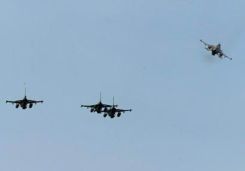 veelzegend: 'Iran's tough nuclear stance dims hope for talks'. Wat als, mede door al dit gesteggel, Iran straks voor de Veiligheidsraad wordt gedaagd? Professor Jorge E. Hirsch werpt een blik in de toekomst door te schrijven: '[...] when Iran's case comes before the SC [Veiligheidsraad] and no sanctions are passed due to Russia's and China's vetoes, the U.S. will be left with no diplomatic options – not a desirable position to be in, unless the purpose all along was to resort to a military option.' In een ander artikel schrijft Hirsch: 'Military action will occur before Russia ships uranium fuel to Iran, and will inevitably lead to the use of nuclear weapons by the U.S. against Iran. How will it all get started? No matter how much Bush and Cheney want it, the U.S. Senate is unlikely to authorize the bombing of Iranian installations out of the blue. Unless there is some major disturbance in Iraq that can be blamed on Iran, Israel is likely to pull the trigger. It knows how to and has every motivation to do so.' veelzegend: 'Iran's tough nuclear stance dims hope for talks'. Wat als, mede door al dit gesteggel, Iran straks voor de Veiligheidsraad wordt gedaagd? Professor Jorge E. Hirsch werpt een blik in de toekomst door te schrijven: '[...] when Iran's case comes before the SC [Veiligheidsraad] and no sanctions are passed due to Russia's and China's vetoes, the U.S. will be left with no diplomatic options – not a desirable position to be in, unless the purpose all along was to resort to a military option.' In een ander artikel schrijft Hirsch: 'Military action will occur before Russia ships uranium fuel to Iran, and will inevitably lead to the use of nuclear weapons by the U.S. against Iran. How will it all get started? No matter how much Bush and Cheney want it, the U.S. Senate is unlikely to authorize the bombing of Iranian installations out of the blue. Unless there is some major disturbance in Iraq that can be blamed on Iran, Israel is likely to pull the trigger. It knows how to and has every motivation to do so.'Mogelijke samenwerking VS en Israël bij in scène zetten aanslag De voorspelling van Hirsch roept uitspraken van Dick Cheney in herinnering, begin dit jaar, die precies deze stappen schetsen: Europese diplomatiek, Iran voor de Veiligheidsraad, sancties, een Israelische aanval. Cheney: 'Well, one of the concerns people have is that Israel might do it without being asked, that if, in fact, the Israelis became convinced the Iranians had significant nuclear capability, given the fact that Iran has a stated policy that their objective is the destruction of Israel, the Israelis might well decide to act first, and let the rest of the world worry about cleaning up the diplomatic mess afterwards.' Heel erg lijkt Cheney daar niet mee te zitten, daar hij bij voorbaat al op de lijn van Israël zit: '[...] look around the world at potential trouble spots, Iran is right at the top of the list.' De 'major disturbance' (Hirsch) waardoor Israël 'might well decide to act first' (Cheney) wordt volgens auteur Webster Tarpley ingezet na een tweede 11 september. Hij herhaalde dit vorige maand op de Axis For Peace-conferentie in Brussel, tijdens een presentatie getiteld Stop the Third World War, een oorlog voortkomend uit de war on terror, die volgens hem is gebaseerd op de mythe van 11 september, waarover DeepJournal al vaak heeft geschreven. Gezien de grote gezamenlijke belangen van de VS en Israël is het niet onmogelijk dat een oud plan uit de kast wordt gehaald: het met toestemming van de Amerikaanse 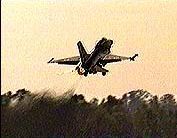 regering torpederen van Amerikanen door Israël waarvan de vijand-van-de-dag, dus in dit geval Iran, de schuld krijgt. Zo'n plan, met vele doden tot gevolg, is al eens uitgevoerd middels Operation Cyanide. Over dit onderwerp heeft DeepJournal al eens uitgebreid geschreven in tijdschrift de Humanist. Het verhaal in het kort is dat de VS in 1967 graag betrokken wilden raken bij de Israëlische strijd tegen Egypte en daarvoor een Amerikaans legerschip opofferden dat zogenaamd door Egypte zou worden aangevallen, terwijl in feite het schip werd aangevallen door ongemarkeerde Israëlische straaljagers, getorpedeerd door Israëlische marineschepen en bestookt met napalm. Een deel van de bemanning overleefde de aanslag tegen alle verwachtingen in en het Amerikaanse vliegtuig dat al onderweg was naar Egypte om de aanval te vergelden met een nucleaire bom, werd teruggeroepen. regering torpederen van Amerikanen door Israël waarvan de vijand-van-de-dag, dus in dit geval Iran, de schuld krijgt. Zo'n plan, met vele doden tot gevolg, is al eens uitgevoerd middels Operation Cyanide. Over dit onderwerp heeft DeepJournal al eens uitgebreid geschreven in tijdschrift de Humanist. Het verhaal in het kort is dat de VS in 1967 graag betrokken wilden raken bij de Israëlische strijd tegen Egypte en daarvoor een Amerikaans legerschip opofferden dat zogenaamd door Egypte zou worden aangevallen, terwijl in feite het schip werd aangevallen door ongemarkeerde Israëlische straaljagers, getorpedeerd door Israëlische marineschepen en bestookt met napalm. Een deel van de bemanning overleefde de aanslag tegen alle verwachtingen in en het Amerikaanse vliegtuig dat al onderweg was naar Egypte om de aanval te vergelden met een nucleaire bom, werd teruggeroepen.Problemen bij een aanval op Iran - 1
DeepJournal
Sign up for the free mailing list. |
|
9 September 2013
Why is Syria under attack? - Part 4
‘Syria’ is about power, money, influence and energy
8 September 2013
Why is Syria under attack? - 3
Syria and Iran are like pieces on a geopolitical chessboard
7 September 2013
Why is Syria under attack? - Part 2
On the interests of the parties involved in the Syrian conflict and the role of the media
6 September 2013
Why is Syria under attack? - Part 1
Who is behind the chemical weapons attack in Syria?
1 April 2013
Albert Spits: Creëer je eigen financiële veiligheid
Beluister het interview
|




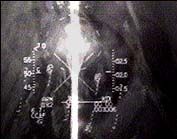 optie ligt op meerdere vlakken, zoals de beperkte beschikbaarheid van troepen. Die problemen zouden deels kunnen worden getackeld door het inzetten van kleine geheime commandotroepen, in plaats van grote hoeveelheden manschappen. Maar de oplossing van het ene probleem, levert het andere op. Rumsfeld heeft het voor elkaar gekregen dat veel van de clandestine operaties van de VS niet meer worden geleid door de CIA, maar door het leger.
optie ligt op meerdere vlakken, zoals de beperkte beschikbaarheid van troepen. Die problemen zouden deels kunnen worden getackeld door het inzetten van kleine geheime commandotroepen, in plaats van grote hoeveelheden manschappen. Maar de oplossing van het ene probleem, levert het andere op. Rumsfeld heeft het voor elkaar gekregen dat veel van de clandestine operaties van de VS niet meer worden geleid door de CIA, maar door het leger.